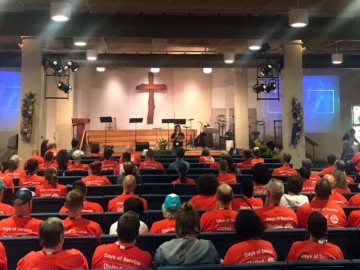
We are excited to announce the launch of Project 250, a new initiative from BIC U.S.
Over the past several decades, we have created vision statements that help guide us for certain periods of time. Project 250 is our latest endeavor that will carry us from now until the Brethren in Christ’s 250th birthday in 2028.
We spoke with National Director Alan Robinson as he shared insights into this project and his hopes for the denomination over the next eight years.
What is Project 250, and how did it come to be?
Project 250 is a set of five priorities that will guide the denomination from now until our 250th birthday in 2028. These priorities did not originate from the top-down; rather they emerged from what we heard from our congregations.
In 2018 and 2019, we invited leaders from across the church to reflect on what they thought we as a denomination should be emphasizing in the next eight to ten years. Pastors and leaders in each region gathered to discuss and pray about this question. Our missionaries around the world also joined the conversation through video conferences. After each meeting, input was provided to Leadership Council who used it to identify five common themes that have now become our priorities.
What are the five priorities of Project 250?
The first priority is reaffirming our identity as a community of Christ followers. There are many denominations, but we want to reaffirm the things that are significant in the history, theology, and identity of the Brethren in Christ.
The second one is placing an emphasis on making lifelong disciples. Obedient discipleship in full surrender to Jesus has always been an important part of our teaching. This journey of discipleship is one that never ends; it continues until the end of life. We want to challenge all of our congregations to make discipleship a priority and to encourage and strengthen people as they walk this lifelong journey.
The third is multiplication. We desire to see multiplication occur across the church. This includes multiplying congregations, missions, and ministries. We understand that for these to multiply there must also be a multiplication of servant leaders. It’s not simply about strengthening what we already have but also asking how we can grow into new areas of ministry.
Number four is fostering global awareness and global impact. The Brethren in Christ has a wonderful history of global ministry. The church today is larger outside of North America than it is within North America. We are increasingly aware that we live in a highly-connected world, and we want to identify these realities and invest in increasing our global impact.
And finally, we want to better reflect the diverse communities in which we exist. So far in our history, the church in North America has been predominantly white. That is changing as more Hispanic brothers and sisters become part of the Church, but there’s a wide spectrum of diversity across our country. Whether it’s skin color, ethnicity, culture, or gender, we want BIC U.S. to better reflect the diversity of our communities.
As we look at these priorities, how is the denomination planning to stay on track with them and track success?
We translated what may sometimes seem like lofty aspirations into specific, measurable goals and objectives that we can track. Under each of the five priorities we have multiple goals that have metrics and measurements built in.
I don’t want to be so naïve in thinking we will exceed or even hit every target. We may miss some. But that’s okay because we’ll be better for the effort that we have given.
How do you hope congregations and individuals will get involved in the project over the next eight years?
I hope congregations feel these goals represent them well and will take ownership of Project 250. Each congregation may not feel equally drawn to all of our priorities. Some priorities might resonate more with certain people depending on their personal passions and ministry contexts.
I also hope there will be broad support for Project 250 across the whole Church. The most important way that each person and congregation can support us is with their prayers. From a financial perspective, congregations can support Project 250 by continuing their support of Common Ministry. Additionally, we are planning a special Project 250 financial campaign and I hope congregations and individuals will be inspired to give sacrificially.
What do you hope BIC U.S. looks like in 2028 as a result of Project 250?
I hope we will be a strengthened and expanded community of Jesus-followers who continue to pursue the identity and values of the Brethren in Christ. I hope that BIC U.S. and the global BIC community will continue to have a significant, edifying impact on each other. I hope we increasingly represent the diversity of our country and communities, and I hope that we have identified and trained new leaders who can lead the Church forward in ministry.
Learn more about Project 250.


